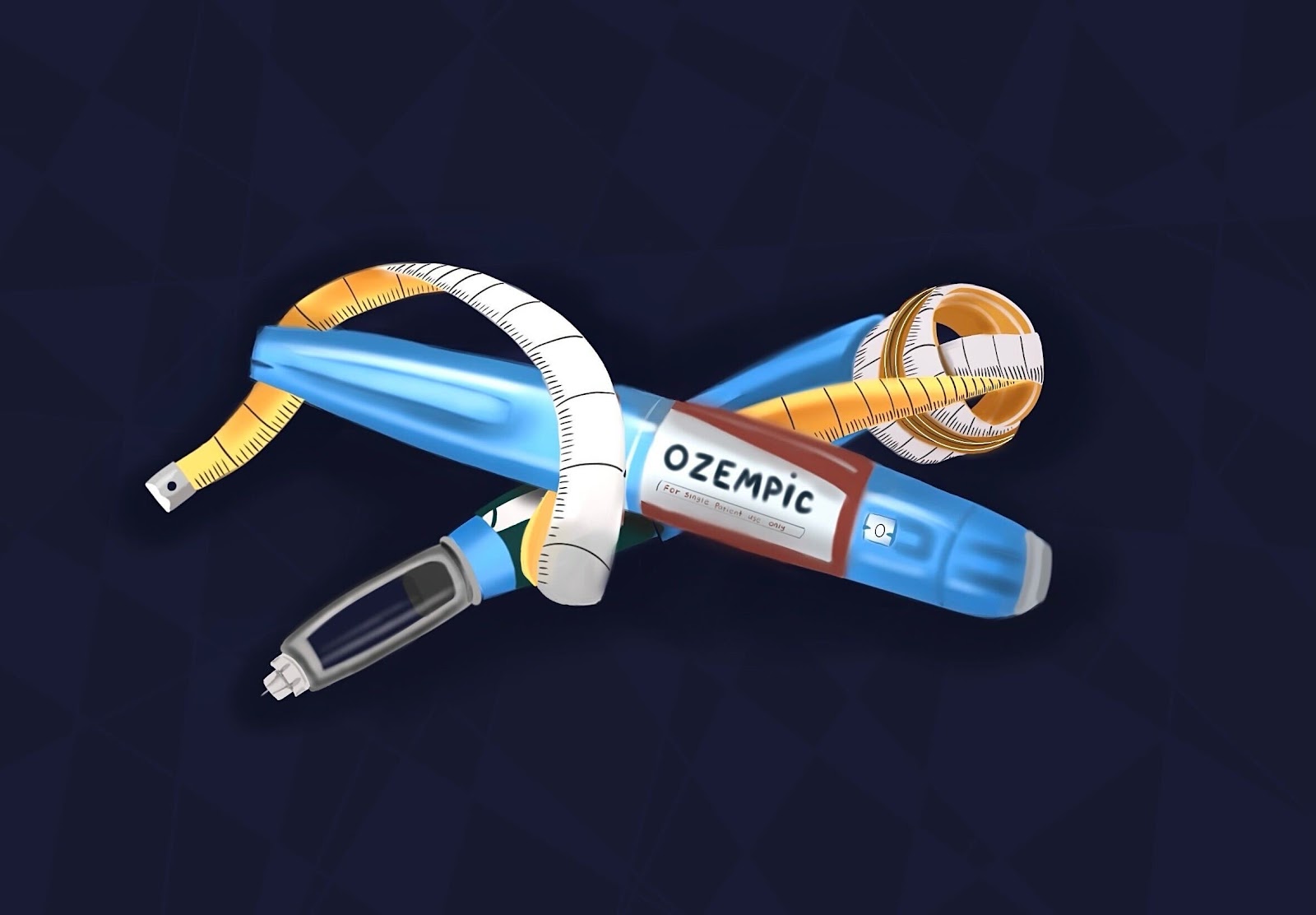The use of Ozempic — a prescription medication made by Novo Nordisk primarily for patients with type two diabetes to lower blood sugar levels, reduce kidney function decline and lower risk of a heart attack or stroke — has been on an exponential rise since 2021. Now, the drug is being prescribed not just for type two diabetes, but also as an off-label treatment for weight loss. Mimicking our naturally produced GLP-1 hormone, Ozempic helps regulate blood sugar, slows digestion and reduces appetite, leading to lower food intake and, ultimately, weight loss.
Ozempic and its counterparts, including Wegovy, Mounjaro and Zepbound, have surged in popularity as a means for weight loss, fueled by celebrity endorsements and slick pharmaceutical marketing. Although there have been a multitude of weight loss success stories from the use of these drugs, the health industry’s choice to market them as a solution to America’s ultra-processed foods issue, misleading product labels and obesity crisis is just a surface-level fix that does not dig into the root of the issue. The United States health industry makes trending wellness practices a point of profit, as they are only accessible to those with the funds to pay for the miracle weight loss drug. Instead of trying to universalize a healthy American lifestyle, the producers of Ozempic are only feeding into a cultural obsession with thinness.
For those without health insurance, Ozempic can cost anywhere from $1,000 to $1,200 or more per month. With insurance, the price may drop to as low as $25 for a three-month supply, however, depending on the age group, coverage can range anywhere from $445 to $1,208 per month. Older adults, who are more likely to experience obesity or type two diabetes — and are the primary demographic prescribed Ozempic — often face the highest insurance costs.
However, the cost of Ozempic and similar weight loss drugs isn’t the main issue, the root of the drug’s development and the way the American health industry markets these drugs as solutions to personal health problems is.
Noticeably, pharmaceutical companies and their commercials for these drugs don’t highlight the seriousness of type two diabetes or the real side effects of these products, oftentimes including nausea, vomiting, constipation and diarrhea, amongst other long-term effects which are still being studied. Instead, the advertisements present images of seemingly effortless weight loss transformations. Even celebrities, such as Elon Musk and others, only highlight the weight loss aspect of the drug.
America’s food industry is notorious for its disregard of civilian health, and weight loss drugs are not undoing the persistent popularity of an unhealthy lifestyle. America’s obesity problem is a direct result of aggressive marketing of unhealthy, ultra-processed foods, the glamorization of a sedentary suburban lifestyle and the work of convincing people to buy into the broader Ponzi scheme of commuting daily to a desk job to make just enough money and achieve the alleged American dream. Along the way, many discover that fast food and packaged snacks tend to be cheaper and more accessible than fresh, whole foods, and they’re often labeled in misleading ways while containing harmful additives.
Many American products contain additives that are banned in countries like France, Japan and the Nordic regions, where the governments focus on early nutrition education, regulate food quality and encourage walking and physical activity from a young age. They are far more proactive in protecting public health than America. As a result, obesity rates remain significantly lower and there’s no cultural obsession with miracle weight loss drugs, unlike there is in the United States.
It doesn’t help that the Food and Drug Administration (FDA) is largely responsible for deciding which chemicals and additives are allowed in our food. The fact that so many harmful ingredients are permitted only reaffirms that the food safety laws passed by the FDA are more focused on profiting from peoples’ poor health than caring for society. Most Americans are exposed to an unhealthy way of living, only to be told later in life that they need to spend thousands trying to undo the damage.
The latest weight loss fixations of Ozempic and similar weight loss drugs are being marketed as an easy way to fix that issue, alongside a number of other currently trending wellness products like pilates classes and $20 Erewhon smoothies — all of which only certain income brackets can regularly afford.
The American health industry has spent years feeding into a cultural obsession with being thin rather than having people seriously attend to their health, and these “miracle” drugs aren’t helping. While these medications can support those with obesity and other health concerns, the frenzy surrounding them and other health services primarily highlight the goal to profit above all else within the American health industry. It thrives by capitalizing on both the consequences of unhealthy lifestyles and the pursuit of healthier ones.
Julia Kremenetsky is an Opinion Staff Writer for the summer 2025 quarter. She can be reached at jkremene@uci.edu.
Edited by Isabella Ehring and Annabelle Aguirre.

